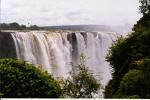Please excuse the delay in this submission, connectivity continues to be difficult.
I feel like a 16 year-old! I received my Zambian driver’s license today, thanks to the great personal network of one of the drivers. Mr. Ngoma convinced a friend to walk through the papers, reducing the one-month process to just a day. Good to have friends in high places.
The Zambian version of the Department of Motor Vehicles is on the western, industrial side of town. Refuse lines the streets (most of it appears to be empty plastic bottles); every couple hundred yards someone has attempted to burn some of the garbage in piles three feet high. Fire is the predominant method to clear things here – whether it is garbage in the streets or weeds in the field. Further down the boulevard is an extremely mad market, with vendors selling clothes from piles laying on the street, food from upright stalls, shoes, phones and all sorts of goods litter the street. Just behind the thoroughfare is a large borough, where the smell of humanity is very strong. Hundreds of people criss-cross the street. As we drive, the smells constantly switch between food, people and the burnt piles of garbage.
The reason to rush the drivers’ permit is we are leaving for Harare, Zimbabwe this weekend. I have to admit that I’m a bit concerned about traveling to Mugabe’s country, all the US State and CIA reports are quite negative. With my personal background I feel I represent that country’s worst nightmare when I reach the border. But I am going with Brian Berkhout, a native of Zimbabwe and one of the white farmers who lost his land to Mugabe’s nationalization plan for its veterans. Brian assures me that Zimbabwe is not only completely safe, but also a far cry better than Zambia in almost every aspect. We are driving down to Harare Sunday.
This week has been all about preparing for this trip. World Bicycle Relief has received a great deal of interest from NGOs working in Zimbabwe and other countries. The bicycle has proved so resilient and successful in Zambia that demand is growing elsewhere. Currently, WBR has tentative requests for about 1000 bicycles, all to be delivered before the end of September. It seems many of the organizations in Harare have fall-out funds remaining from the fiscal year and need to spend that money before the year ends in September. So this week has been about customs, duties, and immigration paperwork that will be necessary and making sure we know how to get around the city of Harare once we arrive.
For me that means some extensive map study, I prefer to always know how to get where I want/need to be, by foot if necessary, in foreign places. This is especially true in Harare if the US reports are anything close to accurate. Call me paranoid if you like, but I prefer to be prepared for the worst.
On the home front, things have improved in Lusaka. The sun finally came out and the temperature is in the 70’s during the day, making the nights more bearable. I think my recent purchase of a space-heater is the reason for the change in weather. The heater cost $75, and we have never turned it on. Personally I’m still dealing with a cold that refuses to go away.
As August is approaching, many of the students working in Zambia begin returning home. Camilla will be the first to leave, so the folks at the Italian embassy are having a farewell dinner for her this weekend. I’m looking forward to the event. She has received requests that she bring “the Americans” since the planners want to have a backyard barbecue – and who knows more about grilling steaks than Americans. I’ll be happy to oblige.












